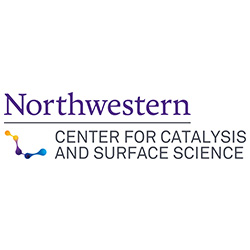Center for Catalysis and Surface Science Monthly Meeting - Dr. Kara Stowers

When:
Friday, March 1, 2024
2:00 PM - 3:00 PM CT
Where: Ryan Hall, 4003, 2190 Campus Drive, Evanston, IL 60208 map it
Audience: Faculty/Staff - Post Docs/Docs - Graduate Students
Contact:
Kimberly Leroi
(847) 467-3396
Group: Center for Catalysis and Surface Science (CCSS)
Category: Lectures & Meetings, Environment & Sustainability
Description:
Center for Catalysis and Surface Science (CCSS) Monthly Meeting
When: Friday, March 1, 2024 | 2:00 – 3:00pm
Where: Ryan Hall. 4003 | Online via Zoom
What: Harnessing the power of metal organic framework templates for rapid, flexible catalyst synthesis
Speaker: Dr. Kara Stowers, associate professor, Brigham Young University
Abstract: Nanoparticle catalysts maximize surface area for reactions, can be supported on a variety of metal oxides, and can be synthesized through a variety of methods. Cu-Zn catalysts are particularly important for the conversion of carbon dioxide to methanol. Co-precipitation and incipient wetness impregnation typically can provide supported nanoparticles with statistically controlled ratios of metal in the final product. We have hypothesized that metal organic frameworks (MOF) can be used as a template for ensuring controllable, tunable, ratios of Cu and Zn in supported nanoparticles. In this talk, different MOF templates are presented that can be synthesized using a water stable, air tolerant bimetallic method within narrow timelines on proof of concept supports. By altering the template synthesis conditions and template removal conditions, the bimetallic nanoparticles have tunable dispersion on the surface as well as a tunable size distribution. Effects of water, temperature, and ligand selection on nanoparticle outcomes are presented. These nanoparticles show reactivity for methanol partial oxidation, a key reverse step for the carbon dioxide conversion.
Speaker Bio: Dr. Stowers received her Ph.D. in 2012 from the University of Michigan, Ann Arbor. Prior to her appointment as faculty at Brigham Young University, she was a Postdoctoral Scholar at Harvard University (2012-2014). The Stowers laboratory takes an interdisciplinary approach towards the research through principles of inorganic, physical, and organic chemistry. Their interest is in developing new catalysts that will decrease the energy and waste required to synthesize commodity chemicals through new pathways. Aside from chemistry, she loves reading, setting goals, and enjoying nature with her family.
The Center for Catalysis and Surface Science (CCSS) monthly meetings host speakers, as well as provide tutorials, research updates and facilitate team collaboration.
The mission of the Center for Catalysis and Surface Science (CCSS) is to promote interdisciplinary research fundamental to the discovery, synthesis, and understanding of catalysts and catalytic reactions essential to modern society. As a part of the Paula M. Trienens Institute for Sustainability and Energy, CCSS applies fundamental advances in catalysis science towards applications in alternative fuels, abatement of harmful emissions, resource recovery concepts, new processing routes, and many other strategies towards making chemicals more sustainable.